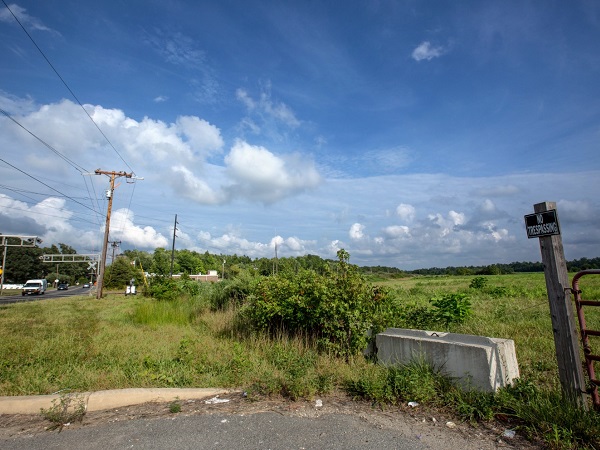Apply now to join our next cohort of Community Science Fellows and Community Leads!

Photo courtesy of Evelyn Hockstein/For The Washington Post
Project Title: Interpreting Local Air Quality Data to Support Pollution Monitoring
Location: Brandywine, MD
The Team:
This project was launched in February 2017 in response to community questions about the nature of emissions from local industrial activity, and the implications of those emissions for the health of residents. The community had access to initial data regarding pollutant levels and sought scientific expertise to translate those results and inform community-led action.
The project team met by phone and in-person regularly throughout the project duration (approximately 2 years) in a dialogue regarding community-led engagement with local industry and how this collaboration could enhance and contribute to that work. They also discussed the availability of reliable data on ambient air quality within the community – or, more commonly, lack thereof. (The team quickly homed in on the problematic spacing of state and federal air monitoring stations. There are no non-industry air quality monitoring stations in Brandywine downwind of the area’s coal-fired power plants.)
Ultimately the team pursued two objectives: a community forum and data collection in a high-sensitivity community location.
The community forum was held in Brandywine in February 2018. This meeting featured speakers from the University of Maryland and Sierra Club, and included discussion on air quality, public health and environmental justice – and how those issues intersect in Brandywine. The forum was an opportunity for residents to gather and discuss their concerns and priorities with one another and with scientists. (A full write-up of this event is available here.)
The second objective – initiation of a data collection campaign – was not achieved through this project, but could potentially be pursued in the future should funding and a suitable location for sampling equipment become available.
Brandywine, Maryland is an unincorporated town in Prince George’s County and home to over 6,000 residents, 72% of whom are African American. The Brandywine community organizes through the Brandywine | TB Southern Region Neighborhood Coalition (the BTB Coalition). Their mission is to create and maintain an environment where “business and community will prosper by supporting all projects and activities which will contribute to the positive growth and development of Prince George’s County, Brandywine and its community.” Despite their efforts, Brandywine continues to face significant challenges relative to air quality and environmental health.
Brandywine faces unhealthy levels of air pollution. Three large fossil fuel-fired power plants (250, 775, and 990 megawatts) are located immediately within Brandywine. The 990-megawatt Panda Mattawoman power plant, soon to be Maryland’s fifth largest fossil fuel-fired power plant, was recently permitted to operate within 13 miles of the community. It is scheduled to go online in 2019. According to Mattwoman’s calculations, pollution from the new power plant will combine with existing pollution to cause excessive levels of nitrogen dioxide emissions, which are linked to heart disease, asthma, and stroke. Prince George’s County, which includes Brandywine, is already in violation of national air quality standards for ozone. Meanwhile, Brandywine residents also face pollution from a coal-ash disposal landfill, a contaminated superfund site (Brandywine DRMO), toxic waste treatment facilities, multiple sand and gravel mines, and highly congested diesel truck traffic. A health impact assessment has shown that this activity negatively affects the air quality in the community, including the local elementary school.
Air quality is an issue of great importance for human rights, public health, and social fairness because of its profound consequences, harms and hazards, including connections to asthma. Nevertheless, the new power plant is authorized to emit pollutants that can worsen Prince George’s County’s ozone problem and emit five times more ammonia than current levels.
The BTB Coalition is extremely concerned about human health impacts from this activity. Residents who live in the immediate proximity of the above-listed pollution sources are more likely to be less educated and low income. Moreover, these individuals are predominantly senior citizens, many of whom live in multi-generational households with young children. Lacking air conditioning, many are consistently exposed to airborne pollutants. They are known to have higher incidences of cancer and asthma.
The BTB Coalition has worked with universities and environmental groups on these issues in the past, but these groups failed to engage with the community as partners, instead undertaking research and leaving without working with the community to make progress together towards local priorities. This project has been conceived and designed in partnership with the BTB Coalition to meet locally-identified needs.
The vision of the BTB Coalition is to achieve sustainable and vibrant communities that encompass all the amenities of a healthy and thriving within the community that translates into empowered residents that actively participate in initiatives to improve the quality of life of their communities. The BTB Coalition sees it as time for an honest conversation about the future health of Brandywine residents. Partnership with a scientist will help achieve these goals.
Kamita Gray, President of the BTB Coalition, and The University of Maryland’s Dr. Akua Asa-Awuku, will work together through TEX to review existing data and health impact assessment reports, as well as publicly available information, and collect additional data as needed to assess the magnitude and nature of local air quality to determine the nature and risk of associated health impacts.
They will review the findings and communicate them with local residents via a community forum. This work will enable Brandywine’s residents to better understand and respond to local environmental impacts.
The BTB Coalition’s community participatory group works to sustain and develop new local and regional partnerships that will significantly influence the health and organizational growth of the community. These collaborative relationships with public and private agencies and organizations is a long-term implementation strategy for Brandywine. A multi-stakeholder partnership is a healthy approach that facilitates mutual understanding of issues and opportunities, brokers consensus on solutions, and leverages resources from multiple stakeholders (skills, funds, equipment, etc.). The BTB Coalition partnership approach provides a mechanism to ensure that community investment is demand-driven and that its value is maximized.

The Brandywine, MD – TEX project was featured in an August 2, 2018 WIRED article by Mejs Hasan: “This Community is Advocating for Air Quality – With Science.”
“KAMITA GRAY AND her mom have spent a lot of time volunteering at Brandywine Elementary School, helping kindergarteners learn to write their names and making sure everyone has a turkey on Thanksgiving and Christmas. Every time they’re at the Maryland school, they’re struck by the heavy black smoke from diesel trucks roaring by, en route from construction sites or delivering mining waste to dumps…”
Photo coming soon!
Kamita Gray is the president of the BTB Coalition and a resident of Brandywine, Maryland.

Akua Asa-Awuku is an Associate Professor in the Chemical and Biomolecular Engineering Department at the University of Maryland – College Park. Akua received her Ph.D. in Chemical Engineering from the Georgia Institute of Technology in 2008. Her research interests are in investigating the formation, composition and measurement of human- and naturally-emitted aerosols and their impacts on climate and human health.

Emmanuel Fofie is a Postdoctoral Associate in the Chemical and Biomolecular Engineering Department at the University of Maryland College Park. Emmanuel received his PhD in Chemical and Environmental Engineering from the University of California, Riverside in 2017. His areas of expertise include characterizing emissions from fossil fuel combustion processes, emission control systems, transportation technology, cloud microphysics and climate change.
(c) 2024 Thriving Earth Exchange